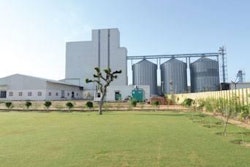Cargill’s pork feed mill in London, Arkansas, is celebrating 35 years without a lost time accident, spanning the facility’s existence and the first to reach the milestone in the Arkansas Department of Labor’s records kept since 1976.
“The London facility began its feed mill operations in 1980, and there has not been a lost time accident since then,” said Pat Pollack, Cargill Pork environment, health and safety (EHS) manager based in Russellville. “There aren’t many businesses in our industry that can make that claim. This accomplishment is not just a milestone for our facility, but a testament to Cargill’s devotion to the safety of its employees. We follow strict guidelines companywide, and firmly believe in the value of providing safety training and resources to all of our employees.”
“The landscape of the world around us was much different when we opened our doors. As the world continues to evolve, so do our safety practices,” stated Bud Akers, Cargill Pork's London feed mill manager. “We want to make sure that we continue to take the steps to not only minimize risks for our employees, but also for the contractors that come to our facility and the community around us. This commitment has allowed us to achieve more than 12,700 days without a lost time accident.”
The facility makes and delivers hog feed for nearly 100 contracted farms in the region, as well as the company-owned Sandy River sow farm, and processes more than 76,000 tons, or 152 million pounds, of feed annually. Jobs include grinding, mixing and pelleting feed, as well as lifting and handling several tons of feed daily and delivering the loads to farms. These tasks often require the use of heavy-duty equipment. The safety program is employee-led and supported by management. Employees accept the responsibility of recognizing safety hazards committed by each other, or by outside contractors, and preventing incidents from occurring. Monthly meetings help address critical tasks and provide time for safety demonstrations.
“We’re in a business with a high demand for physically-intensive labor. We are dedicated to doing what we can to ensure that our employees remain happy and healthy during and after their time at Cargill,” explained Akers. “Our safety program helps employees feel empowered. They know that if they address a safety issue with co-workers, they have the support of management to do so. We understand that with these jobs, your life can change in a matter of seconds. It’s important to emphasize proper use of equipment and safety practices.”















